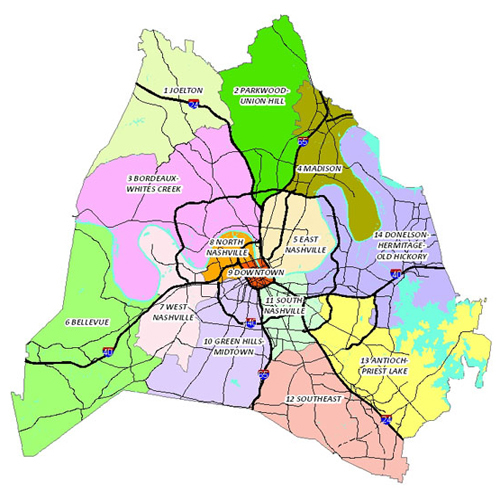Metro Nashville’s fourteen Community Plans are future planning documents adopted by the Metropolitan Planning Commission that describe the role each community plays in realizing the overall vision of the County – what residential, commercial, office, and open space each community will house for the County. Community Plans are prepared by the Metro Planning Department in cooperation with residents, business owners, property owners, institutional representatives, developers, and elected officials.
NashvilleNext (Nashville’s comprehensive plan) includes all the 14 community plans. Community Plans provide guidance and consistency for land use decisions over the long term. Community character (land use) policies are applied to every area. Each plan is guided by the Community Character Manual (CCM), a countywide document which provides design details for policies and their direction for zoning and development decisions.
While Community Plans provide guidance over the long term, they are not static documents. Community Plans can be amended from time to time to take advantage of new opportunities, address new ideas, or respond to identified problems. Amendments are considered with input from community members, private investors, local institutions, and other Metro agencies. The process for updating community plans is open to the public and includes significant community participation. Sometimes a plan amendment is generated by a property owner’s request and application. At other times, an amendment occurs as part of a Local Planning Study.
Community Character Manual policies, and their transects, have a limited role in subdividing land. Transects determine which section of the Subdivision Regulations apply to a subdivision request to ensure harmonious development in light of a community's long-range vision. Community Character Manual policies are not otherwise referenced during subdivision review.
Applications and Fees
Before applying for a Community Plan amendment, applicants should review the Application Procedures Document. Then, contact PlanningStaff@nashville.gov.
Pre-application Meeting Request Form
The Community Plan Amendment Application covers the following requests:
Major Plan Amendment: $9,150
Requires one or more community meetings convened by the Planning Department prior to a public hearing.
Minor Plan Amendment: $4,350
May require a community meeting convened by the Planning Department prior to a public hearing. The need for a community meeting will be determined by the Planning Department Executive Director.
Street Tree Plan
Street Tree Plan Procedures and Application: Fees vary, and are detailed in the application file

